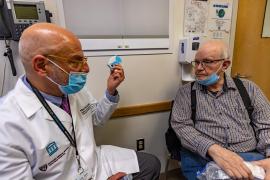‘Encouraging Progress’ in Quest for AIDS Vaccine Challenged by Virus That Survives and Thrives
There is "encouraging progress" in the quest for a vaccine against HIV, but virus that survives inoculation may be able to mutate and "sidestep" the treatment, vaccine researchers from Merck Research Laboratories and Harvard Medical School report in two studies published in today's issue of the journal Nature, Agence France-Presse reports. A team led by Emilio Emini of Merck tested three vaccine candidates -- all were designed to stimulate a cytotoxic T lymphocyte response to obliterate infected cells but used different methods of delivery -- on monkeys that had been infected with SHIV, a hybrid of HIV and the simian immunodeficiency virus. Seventy days after inoculation, the monkeys who had received the vaccine that used adenovirus type 5 as a vector and those that received booster shots of a plasmid DNA vaccine had 10 times the CD4+ T cells and their viral loads were between 10 and 50 times lower than the monkeys who did not receive any vaccine. Based on these results, Emini's team labelled Ad5 a "promising vaccine vector" for fighting HIV-1, the most common form of the virus.
The Bad News
However, a separate team led by Dan Barouch of Harvard had less encouraging news. Barouch's team found that seven of eight rhesus monkeys that received a CTL-focused vaccine "successfully fought" SHIV, but the virus mutated and eluded the vaccine in the eighth monkey (Agence France-Presse, 1/16). The team inoculated the monkeys with a vaccine developed by Merck that contained two HIV genes and interleukin-2, an immune system molecule that "revs killer
T cells into high gear." They then infected the monkeys with the virus. The vaccine was supposed to trigger a strong response from the killer T cells responsible for attacking infected cells, identifiable through small fragments of viral DNA called epitopes on their outer layer. In the monkey in which the vaccine failed, the virus made a single gene mutation that changed the shape of the epitope, making it unrecognizable to the T cells. Norman Letvin, one of the Harvard researchers, said that based on previous research he, "felt confident" that the reserve of killer T cells would adjust and attack the mutated virus. However, he was wrong. All of the virus in the monkey mutated within six weeks, and the monkey soon became ill and died. "To see complete replacement of the virus in such a short period of time just took my breath away," Letvin noted. However, all of the other monkeys are still controlling their HIV levels and have remained healthy for more than two years after vaccination.
A Setback or Just a Warning?
The fact that the reserve of killer T cells was unable to recognize and attack the mutated virus is "particularly disturbing" for vaccine researchers. Killer T cells only recognize a few HIV epitopes. Some researchers have been investigating ways to increase the number of epitopes the cells target, thereby forcing HIV to make more than one mutation in order to evade a vaccine. However, if the back-up T cells fail to respond as they did in the monkey, the effect would be negated. Despite the report, some vaccine researchers remained nonplussed. "It's one monkey. I would not get that alarmed," Seth Berkley, president of the International AIDS Vaccine Initiative, said (Schoofs, Wall Street Journal, 1/17). Emini's team has seen no such mutations in its vaccinated monkeys. "We've gone 500 days and not seen any escape. It's something to watch for. But if the vaccine elicits a sufficiently broad genetic response, this is going to be an issue we can deal with," Emini added (Verrengia,
AP/Newsday, 1/16). Letvin said that HIV's ability to mutate and escape the vaccine "provides a caveat" about possible pitfalls that await HIV vaccine candidates in humans, but added that it is "certainly not a devastating caveat." He noted that mutations may "always be lurking" and said that "[m]any years of hard work (remain)" before a vaccine will be ready for widespread human use (Norton, Reuters Health, 1/16).
Merck Negotiating to Test Antibody Vaccine
In related vaccine news, Merck is negotiating with the Institute of Human Virology, a
not-for-profit research center in Baltimore founded by HIV
co-discoverer Robert Gallo, to conduct trials of the institute's experimental antibody vaccine, the Wall Street Journal reports. The vaccine is designed to elicit an
antibody response to HIV, an approach that has "proved difficult" because the virus is able to hide the best antibody targets on its surface with amino acid strands known as "variable loops" and large carbohydrate molecules. However, when the virus attaches to the CD4 molecule on the surface of a cell it briefly exposes some potential antibody targets. The vaccine -- which uses a "fusion" of CD4 and gp120, a "critical part of HIV's envelope," to elicit the antibody response -- focuses on that moment when the virus first attaches to the cell. Anthony DeVico, one of the vaccine's developers, said no agreement had been made, but added that negotiations are ongoing (Schoofs, Wall Street Journal, 1/17).






